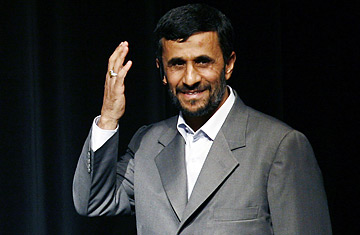
Iranian President Mahmoud Ahmadinejad waves after his speech at Columbia University, September 24, 2007.
The Cheshire Cat smile worn by Mahmoud Ahmadinejad during his address at Columbia University on Monday was no surprise — the event was a resounding victory for the Iranian President. Of course, students and faculty in the hall jeered many of his comments, while protestors outside denounced him as the new Hitler. And Columbia University president Lee Bollinger — clearly stung by criticism of the institution for hosting Ahmadinejad — used his introduction to excoriate the Iranian leader as everything from a "cruel and petty dictator" to "astonishingly uneducated." But all of this was merely grist for Ahmadinejad. The furor it had created ensured that what might have passed as a relatively obscure address in a small Ivy League auditorium turned into a national media event, in which the Iranian President had the microphone, unmolested, for the best part of an hour.
New York City Council Speaker Christine C. Quinn had criticized Columbia for hosting Ahmadinejad, warning that "all he will do on that stage ... is spew more hatred and more venom out there to the world." Not quite. Despite the harsh words of his host, Bollinger, Ahmadinejad stayed on message, appearing relaxed, reasonable, open, even charismatic. Whether or not American TV audiences are seduced is beside the point, because Ahmadinejad's primary audience is not American. The provocations of his New York visit are an integral part of his domestic political strategy, which depends on his ability to hold America's national attention with an unapologetically nationalist message about Iran's nuclear rights, lecturing them about God and their aim to run the world.
It was pure political jujitsu, using the momentum of your adversaries to your own advantage. The protestors got him on TV, and he used the platform to grandstand for the folks back home. He will share an even bigger global platform with President Bush on Tuesday, at the lectern of the U.N. General Assembly. The two men won't appear together, of course, but each is making a pitch for international support in the showdown over Iran's nuclear issue. But Ahmedinajad appeared to steal a march on Bush Monday by virtue of his televised propaganda show at Columbia.
Challenged on his statements questioning the Holocaust, for example, Ahmadinejad cleverly turned the issue around, asking, "Why is it that the Palestinian people are paying the price for an event they had nothing to do with?" That argument may not get much sympathy with an American audience, but championing the Palestinian cause helps Iran's strategy of undermining the moderate Arab regimes allied with Washington.
Ahmadinejad's primary audience, however, is in Iran, because — despite Bollinger's assertion that he is a dictator — the Iranian President faces reelection in 2009. As things stand, his failure to deliver on the economic promises he made in his first campaign and the deterioration of Iran's global position puts him at substantial risk of losing to the more pragmatic elements in the Iranian leadership, who are already campaigning against him. Playing the nuclear card as an expression of Iranian national pride has always been part of his domestic political game, and the breathless television coverage his visit has prompted in the U.S. won't do his domestic prospects any harm.
